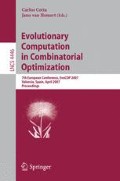Abstract
We present a Lagrangian decomposition approach for the Knapsack Constrained Maximum Spanning Tree problem yielding upper bounds as well as heuristic solutions. This method is further combined with an evolutionary algorithm to a sequential hybrid approach. Experimental investigations, including a comparison to a previously suggested simpler Lagrangian relaxation based method, document the advantages of the new approach. Most of the upper bounds derived by Lagrangian decomposition are optimal, and together with the evolutionary algorithm, large instances with up to 12000 nodes can be either solved to provable optimality or with a very small remaining gap in reasonable time.
Access this chapter
Tax calculation will be finalised at checkout
Purchases are for personal use only
Preview
Unable to display preview. Download preview PDF.
References
Yamamato, Y., Kubo, M.: Invitation to the Traveling Salesman’s Problem (in Japanese). Asakura, Tokyo (1997)
Yamada, T., Watanabe, K., Katakoa, S.: Algorithms to solve the knapsack constrained maximum spanning tree problem. Int. Journal of Computer Mathematics 82(1), 23–34 (2005)
Pirkwieser, S.: A Lagrangian Decomposition Approach Combined with Metaheuristics for the Knapsack Constrained Maximum Spanning Tree Problem. Master’s thesis, Vienna University of Technology, Institute of Computer Graphics and Algorithms (October 2006)
Aggarwal, V., Aneja, Y., Nair, K.: Minimal spanning tree subject to a side constraint. Comput. & Operations Res. 9(4), 287–296 (1982)
Jörnsten, K., Migdalas, S.: Designing a minimal spanning tree network subject to a budget constraint. Optimization 19(4), 475–484 (1988)
Fisher, M.L.: The Lagrangian Relaxation Method for Solving Integer Programming Problems. Management Science 27(1), 1–18 (1981)
Fisher, M.L.: An application oriented guide to Lagrangean Relaxation. Interfaces 15, 10–21 (1985)
Beasley, J.E.: Lagrangian relaxation. In: Reeves, C.R. (ed.) Modern Heuristic Techniques for Combinatorial Problems, pp. 243–303. John Wiley & Sons Inc., New York (1993)
Kruskal, J.B.: On the shortest spanning subtree of a graph and the travelling salesman problem. In: Proc. of the AMS, vol. 7, pp. 48–50 (1956)
Prim, R.C.: Shortest connection networks and some generalizations. Bell Systems Technology Journal 36, 1389–1401 (1957)
Fredman, M.L., Sedgewick, R., Sleator, D.D., Tarjan, R.E.: The pairing heap: A new form of self-adjusting heap. Algorithmica 1(1), 111–129 (1986)
Kellerer, H., Pferschy, U., Pisinger, D.: Knapsack Problems. Springer, Berlin Heidelberg New York (2004)
Martello, S., Pisinger, D., Toth, P.: Dynamic programming and strong bounds for the 0–1 knapsack problem. Management Science 45, 414–424 (1999)
Barahona, F., Anbil, R.: The volume algorithm: producing primal solutions with a subgradient method. Mathematical Programming 87(3), 385–399 (2000)
Haouaria, M., Siala, J.C.: A hybrid Lagrangian genetic algorithm for the prize collecting Steiner tree problem. Comput. & Operations Res. 33(5), 1274–1288 (2006)
Magnanti, T.L., Wolsey, L.A.: Optimal trees. In: Ball, M.O., et al. (eds.) Handbooks in Operations Research and Management Science, vol. 7, pp. 503–615. Elsevier Science, North-Holland, Amsterdam (1995)
Julstrom, B.A., Raidl, G.R.: Edge sets: an effective evolutionary coding of spanning trees. IEEE Transactions on Evolutionary Computation 7(3), 225–239 (2003)
Author information
Authors and Affiliations
Editor information
Rights and permissions
Copyright information
© 2007 Springer Berlin Heidelberg
About this paper
Cite this paper
Pirkwieser, S., Raidl, G.R., Puchinger, J. (2007). Combining Lagrangian Decomposition with an Evolutionary Algorithm for the Knapsack Constrained Maximum Spanning Tree Problem. In: Cotta, C., van Hemert, J. (eds) Evolutionary Computation in Combinatorial Optimization. EvoCOP 2007. Lecture Notes in Computer Science, vol 4446. Springer, Berlin, Heidelberg. https://doi.org/10.1007/978-3-540-71615-0_16
Download citation
DOI: https://doi.org/10.1007/978-3-540-71615-0_16
Publisher Name: Springer, Berlin, Heidelberg
Print ISBN: 978-3-540-71614-3
Online ISBN: 978-3-540-71615-0
eBook Packages: Computer ScienceComputer Science (R0)

